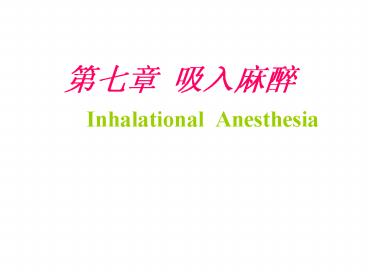??? ???? Inhalational Anesthesia - PowerPoint PPT Presentation
1 / 29
Title: ??? ???? Inhalational Anesthesia
1
??? ???? Inhalational Anesthesia
2
???? (introduction) 1.??(concept)
2.??(characteristic)
- ????
- ???????
3
???????????????? Uptake, distribution and
elimination of inhalational anesthetics
- 1??????Uptake and distribution
- ?????? central nerve system
- PA PB PBr ????
- dynamic equilibrium
4
?????????
- ???? inspired concentration
- ????? minute volume
- ?/?????
- blood/gas partition coefficient
- ???????
- perfusion of pulmonary
5
2.?? Elimination ??????????? Eliminated
mostly in an unchanged form via the lungs
?????????? a small proportion is metabolized
in liver and eliminated via kidney
6
???????????? Clinical evaluation of
inhalational anesthetics
- 1.??? controllable
- ? ??/???????
- associated with blood/gas partition coefficient
- 2. ???? anesthetic potency
- ? ??/???????
- associated with oil/gas partition coefficient
- ? MAC(minimal alveolar concentration)
7
MAC is minimal alveolar concentration of an
inhalational anesthetic at 1 atmosphere absolute
that prevents movements of 50 of the population
to a standard stimulus.
- 3. ???????
- Effects on Cardiovascular system
- ? ????
- depression of myocardial contractility
8
????????????????
- Increased myocardial excitability
- Arrhythmias are common during halothane
- Increased circulating catecholamines
9
????? Respiratory depression
dose-dependent depression of ventilation
?????? irritant to respiratory depression
????????? relaxation of bronchial
smooth muscle
4.?????? Effects on respiratory
10
5.???????? Effects on neuromuscular junction
- ?????,??????????
- Skeletal muscle relaxation and potentiates
non-depolarizing relaxants. - ??????????
- Skeletal muscle relaxation of enflurane is
the greatest in all inhalational anesthetic . - ???????????????,????????
- Hatholane relaxes uterine muscle and may
cause postpartum hemorrhage.
11
6.?????EEG??? Effects on ICP and EEG
- ??????,???????
- increase ICP, and this action of isoflurane
is the lowest in all volatiles. - ???EEG,?????????EEG??
- Dose-dependent depression of EEG
activity, at moderate to high concentration (more
than 3), enflurane produces epileptiform
paroxysmal spike activity.
12
7.?????????? Properties of the ideal
inhalational anesthetic
- Pleasant odour, non-irritant to respiratory
depression - low blood/solubilityrapid induction and recover
from anesthesia - Neither flammable nor explosive
- Producing unconsciousness with analgesia and some
degree of muscle relaxation - Not be metabolized in the body, non-toxic, not
provoke allergic reactions - Minimal depression of cardiovascular and
respiratory system and not interact with the
other drugs used commonly during anesthesia, e.g.
catecholamines.
13
8.?????-???? anesthetic gasnitrous oxide
? ? ????,???????? low-toxicity, light
depression of cardiovascular system ???????
non-irritant to respiratory depression
???????? suitable for seriously ill
patient ? ?????? rapid induction and
recover from anesthesia
14
???? announcements
- ??????????,????????????,??vitB12
- Affects vitamine B12 synthesis when the
duration of nitrous oxide exceeds 8 hours. - ???????,???????30,??,?????
- Diffusion hypoxia essential to administer a
minimum FiO2 of 30 - ??????,???????????????
- Good analgesia, poor anesthesia, is used
combination with enflurane or isoflurane
15
?????????? Inhalational anesthesia outfit
- ?? Gases
- ??? Flow meters
- ??? Vaporizers
- ??? Breathing bag
- ????? Anesthetic breathing system
- ???? Breathing value
- ????????
- Canister or carbon dioxide absorber
16
(No Transcript)
17
?????????? Methods of Inhalational
anesthesia ? ???(open circuits))???????
?????????
- ??
- ??????,?CO2????
- ??
- ???,???????????
- ??????????????????
- ??
- ?????,????
- ?????????????????,
- ????
- ?????????
18
? ????(semi-open circuits) suitable for
spontaneous
19
?? ???????????,?CO2???? ????????,????CO2lt1
?? ???????(??????2-3?), ????????CO2??
Fresh gas flow rate must be very high (at
least 2-3 times Alveolar minute volume to prevent
rebreathing) ????T???
- ????????????
- ????20Kg????,??????????
- ????????,?????????
20
????? semi-closed circuits
- ??
- ???????,?????????,?
- ???CO2????
- ??
- ???????,????CO2??
- ??
- ???????,?????
- ????????????????
21
????closed circuit or circle system is the only
true circuit as anesthetic gases are recycled.
- ??
- ?????,?????????,?CO2????,??? exhaled alveolar gas
is rebreathed entirely - ??
- ?CO2????
- ????????,?????????????
- ???????,??????????
- ????????????,??????
- ??
- ?????
- ??????CO2??,???????
- ????????
22
???????? Inhalational anesthesia with Low flow
rate
- ??
- ????gt4L/min------???????
- ????lt2L/min------???????
- ??????????
- ??
- ??
- ?N2O???,?????lt30????
- ??????????
- ????????????????
- ????
23
????????????? Induction, maintenance and
recovery of inhalational anesthesia
- ??
- ????
- ??????
- ???????????????????????
- ???????????
- ??
- ????????,????????
- ??
- ????????,?????
- ????,??????????
24
??????????? Management during inhalational
anesthesia
- ??????preanesthetic preparation
- ? Preanesthetic visit to assess the risks of
anesthesia and surgery and to plan the anesthetic
management. - ? Anesthetics, equipment for monitoring
anesthetic machine and intravenous fluids should
be prepared. - ??????? monitoring depth of anesthesia
- ????????
25
1.???? respiratory system
????-----???????
maintaining the airway
- ??
- ????????????
- ??
- ??????????????????
- ????????,??????
- ?TV?MV?SPO2?????----??????
- CO2??
26
????Abnormal breathing ?????--????,??(??????????
) MV?, brachypnea, hypoxia ??????(airway
obstruction)???? (Dyspnoea),???(three
depressions sign) ?CO2??????HR??BP? ??????
(Upper respiratory tract obstruction )
??????? ??????( Lower respiratory tract
obstruction )
??(regurgitation)???? (secretion)??????(Br
onchospasm) ?????????????(distortion of
tracheal tube)?????(foreign body in
trachea)??????(malfunction of
anesthesia apparatus )
27
2.????
?? ????,???? Cardiac sound and rhythm ?
Blood pressure, peripheral pulse, urine volume
MAP?CVP?PAWP?CO ECG???????????
arrhythmia and myocardial ischemia
HypovolemiaBP??P???????????CVP? Cardiac
failureBP??P???CVP??
?????????????? Deep Anesthesia BP??P?
28
3.????????????
- ?????---????
- ???---???????
- ???????
- ????????????---????
- ????????????????---
- ????????
- ???????
- ???? ??????
- ???????????????
- ???? Intraoperative awareness
29
???CO2?????
- ??????Initial signs of hypoxia
- BP??HR?????????(cyanosis)
- CO2??????Initial signs of carbon
- dioxide retention BP??HR???????????
- ?????CO2????
- ?????(respiration is irregular)?BP??HR?????????
?????

